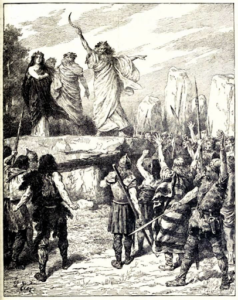Negative stereotypes in Ireland trace back to their Celtic ancestors who were once openly criticized by outsiders as barbaric heathens with crude traditions and little understanding of the world. Druid traditions were labeled as “pagan” and were often exaggerated by conquerors and explorers such as the Romans as justification for their destruction. Julius Caesar once depicted a druid ritual as including the grisly sacrifice of numerous people within a giant wicker man as an offering to the gods. The truth of this is questionable, and is likely an early attempt to codify the Celts as barbaric. While it is likely that ancient forms of human sacrifice existed, connections to the druids seem especially biased and circumstantial. The Druids and Celts were also portrayed as a warmongering people; seekers of battle and destruction.

This stereotype lived on with the English and their conquest of the Irish. It is a common trend among conquerors to justify themselves and establish their superiority over those they have conquered by labeling them as barbaric, uncivilized savages. Englishman, Edmund Spenser, provides a perfect example of this outlook through his essay: A View of the State of Ireland (1596), in which he describes the Irish people as “barbaric”, “heathenish”, “brutish and filthy”, and “superstitious”. His specific emphasis on their laziness, criminal nature, and love of war as indications of their evil nature is telling of his bias towards the Irish people and his goals of persuading the English public against towards them. Spenser’s use of these negative stereotypes illustrates their harmful potential; a sort of weaponized opinion against the Irish people. To label the entirety of the Irish people in such a negative light is unrealistic and can only have been done with the intent to influence public opinion against the Irish.
Even as opinion of the Irish people evolved to encompass more positive characteristics, the lingering notion of Irish nature being rooted in a barbaric and uncivilized history prevailed. English overseers (Big House Ascendancy) of the Irish remained suspicious of their Irish subjects, always afraid of their true motivations. There would always be something just below the surface that those of English descent couldn’t quite trust, a result of lingering stereotypes towards the Irish as murdering criminals and liars, no doubt. The Famine would further accentuate the dangerous nature of these lingering stereotypes as the English refused to provide the Irish with aid in their time of need, in part due to the idea that the Irish simply weren’t working hard enough to fix the problem themselves.
“Barbaric heathens” evolved into “promiscuous, lazy drunkards with a penchant for violence”, and while the second would prove less dangerous to the Irish people, it was no less derogatory and continued to reinforce English superiority over the Irish. With revolution came nationalism, and the attempt to dismantle negative stereotypes and replace them with new Irish ideals.
